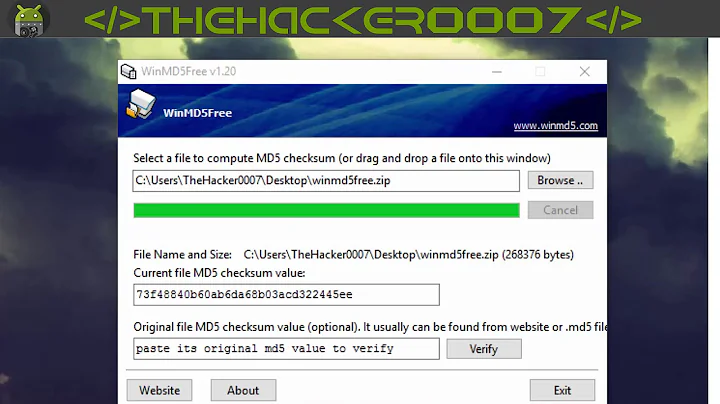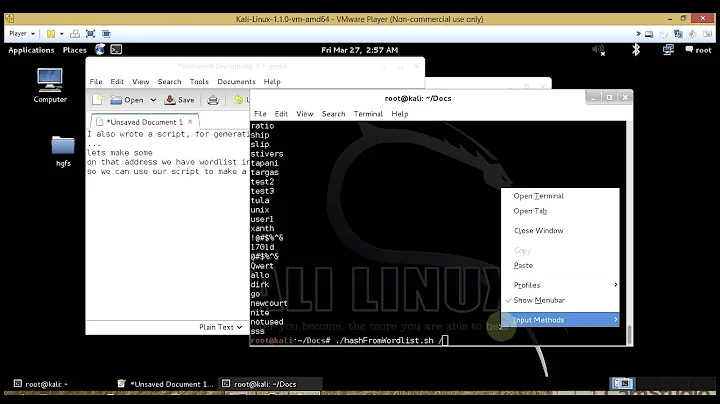Generate MD5sum for all files in a directory, and then write (filename).md5 for each file containing that file's MD5SUM
Solution 1
cd /path/to/files &&
for file in *; do
if [[ -f "$file" ]]; then
md5sum -- "$file" > "${file}.md5"
fi
done
Solution 2
Redirection is an operator of the shell.
In:
find some args > {}.md5
find is run with some args and its stdout redirected to {}.md5.
Here, you'd need find to start a shell to perform one redirection for each file:
find . -type f -exec sh -c '
for file do
md5sum "$file" > "$file.md5"
done' sh {} +
If you want to avoid the directory component in the .md5 part, you can either use the -execdir alternatives supported by many find implementations (though with some you'll still get a ./ directory component, and with some, that will still run one shell per file even with {} +:
find . -type f -execdir sh -c '
for file do
md5sum "$file" > "$file.md5"
done' sh {} +
Or you can do it as:
find . -type f -exec sh -c '
for file do
(cd "${file%/*" && exec md5sum -- "${file##*/}") > "$file.md5"
done' sh {} +
Related videos on Youtube
Matthew
Updated on September 18, 2022Comments
-
Matthew almost 2 years
I have a directory full of files. Each file will be copied to a specific type of destination host.
I want to calculate an MD5 sum for each file in the directory, and store that md5 sum in a file that matches the name of the file that generated the sum, but with .md5 appended.
So, for instance, if I have a directory with:
a.bin b.bin c.binThe final result should be:
a.bin a.bin.md5 # a.bin's calculated checksum b.bin b.bin.md5 # b.bin's calculated checksum c.bin c.bin.md5 # c.bin's calculated checksumI have attempted this with find exec, and with xargs.
With find, I tried this command:
find . -type f -exec md5sum {} + > {}.md5Using xargs, I tried this command:
find . -type f | xargs -I {} md5sum {} > {}.md5In either case, I end up with a file called {}.txt, which isn't really what I am looking for.
Could anyone point out how to tweak these to generate the md5 files I am looking to generate?
-
telcoM over 6 yearsLooks OK, but you're restricting it to .iso files.
-
 Kusalananda over 6 yearsParses output of
Kusalananda over 6 yearsParses output oflsand uses unquoted variable expansions. -
Ming Jia over 6 yearsCan you explain your comments? you can replace ls with find or any other command.
-
 Kusalananda over 6 yearsAssume spaces in any of the names in the
Kusalananda over 6 yearsAssume spaces in any of the names in thefilesdirectory, for example. Also consider what would happen if one of the names is a directory. -
 Sergiy Kolodyazhnyy over 6 years@MingJia Parsing output of
Sergiy Kolodyazhnyy over 6 years@MingJia Parsing output oflsis considered generally bad practice (see this ). Even if there aren't any difficult filenames, that doesn't mean one shouldn't anticipate them. Second big problem is the$0and$1should be double-quoted. Because of "word splitting", if you have file with spaces or tabs in filename, ` > $1` will haveambiguous redirecterror. Tryvar="with space.txt"; echo "hi" > $varand thenvar="with space.txt"; echo "hi" > "$var" -
 Sergiy Kolodyazhnyy over 6 years@MingJia Don't get discouraged, you'll learn to pick up on these things if you stick around on the site, with time of course. Welcome, to the site and consider re-working your answer.
Sergiy Kolodyazhnyy over 6 years@MingJia Don't get discouraged, you'll learn to pick up on these things if you stick around on the site, with time of course. Welcome, to the site and consider re-working your answer. -
 Kusalananda over 6 yearsYeah, what he said. Sorry for being a bit short in my comments above. Your answer is welcomed, definitely, and I'm known to sometimes be a bit strict in my code reviews...
Kusalananda over 6 yearsYeah, what he said. Sorry for being a bit short in my comments above. Your answer is welcomed, definitely, and I'm known to sometimes be a bit strict in my code reviews...




